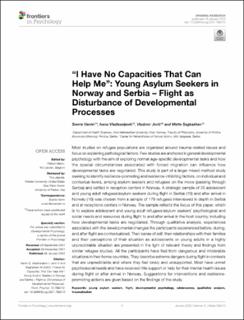“I Have No Capacities That Can Help Me”: Young Asylum Seekers in Norway and Serbia – Flight as Disturbance of Developmental Processes
Peer reviewed, Journal article
Published version
Permanent lenke
https://hdl.handle.net/11250/2982131Utgivelsesdato
2022-01-05Metadata
Vis full innførselSamlinger
Originalversjon
https://doi.org/10.3389/fpsyg.2021.786210Sammendrag
Most studies on refugee populations are organized around trauma-related issues and focus on explaining pathological factors. Few studies are anchored in general developmental psychology with the aim of exploring normal age-specific developmental tasks and how the special circumstances associated with forced migration can influence how developmental tasks are negotiated. This study is part of a larger mixed method study seeking to identify resilience-promoting and resilience-inhibiting factors, on individual and contextual levels, among asylum seekers and refugees on the move (passing through Serbia) and settled in reception centers in Norway. A strategic sample of 20 adolescent and young adult refugees/asylum seekers during flight in Serbia (10) and after arrival in Norway (10) was chosen from a sample of 178 refugees interviewed in depth in Serbia and at receptions centers in Norway. The sample reflects the focus of this paper, which is to explore adolescent and young adult refugees/asylum seekers’ psychological and social needs and resources during flight to and after arrival in the host country, including how developmental tasks are negotiated. Through qualitative analysis, experiences associated with the developmental changes the participants experienced before, during, and after flight are contextualized. Their sense of self, their relationships with their families and their perceptions of their situation as adolescents or young adults in a highly unpredictable situation are presented in the light of relevant theory and findings from similar refugee studies. All the participants have fled from dangerous and intolerable situations in their home countries. They describe extreme dangers during flight in contexts that are unpredictable and where they feel lonely and unsupported. Most have unmet psychosocial needs and have received little support or help for their mental health issues during flight or after arrival in Norway. Suggestions for interventions and resilience-promoting actions are given based on the findings of the study.

